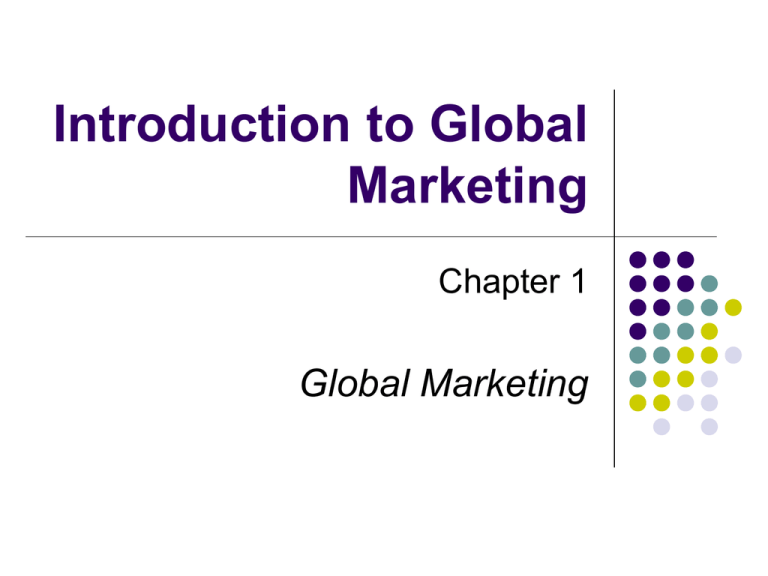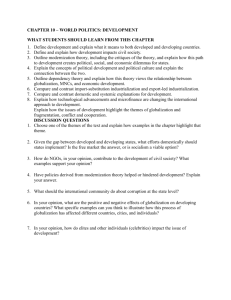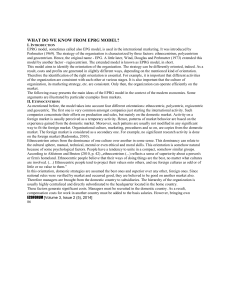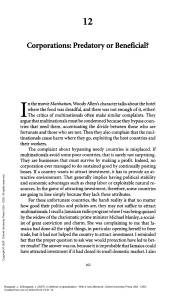Introduction to Global Marketing Global Marketing Chapter 1
advertisement

Introduction to Global Marketing Chapter 1 Global Marketing Go, Canada Go Canada is the third best country in the world to live in (UN) In terms of competitiveness 1st in technological innovativeness 3rd in environmental sustainability 7th in the networked economy (e-commerce) 9th in information infrastructure 11th in overall competitiveness of the economy Source: http://www.weforum.org Why should Canada care? 45% of everything that Canadians produce is exported Canada exports about $500 billion in goods & services, that is more than $15,000 for every Canadian Balance of Trade: + $58 billion (in 2002) Source: http://www.dfait-maeci.gc.ca/tna-nac/ Global Trends World trade has grown from $200 billion to more than $7 trillion in the past three decades. Trade growth has been twice as fast as global production growth Visible benefits of free trade: generally increasing standard of living Nations vs. multinationals (MNCs) Where are products made in (cars in Canada?) New trading blocs are emerging (NAFTA) Definitions Marketing is delivering customer satisfaction at a profit Marketing is the process of planning and executing the conception, pricing, promotion, and distribution of goods, ideas, and services to create exchanges that satisfy individual and organizational goals. Global marketing focuses on global market opportunities and threats: Why go international / global? Growth Access to new markets: USA, Mexico, Japan, EU Access to resources: natural, human, $$$ Survival Compete with lower costs due to increased access to resources and economies of scale Isolation is impossible, multinationals enter into practically all markets Why go international / global? For US-based companies, 75% of sales potential is outside the US 90% of Coca-Cola’s operating income is generated outside the US. For Japanese companies, 85% of potential is outside Japan For German companies, 94% of potential is outside Germany For Canada? About 97% Global Industries An industry is global to the extent that a company’s industry position in one country is interdependent with its industry position in another country Indicators of globalization: Ratio of cross-border trade to total worldwide production Ratio of cross-border investment to total capital investment Proportion of industry revenue generated by companies that compete in key world regions Global Firms = Multinational Companies (MNCs) Transnationality Index Rankings: 1. Nestle (Switzerland) 2. Thomson Corp (Canada, information systems) 3. Holderbank Financiere (Switzerland) 4. Seagram Company (Canada) 5. Solvay (Belgium) 6. ABB Asa Brown Beveri (Switzerland) 7. Electrolux (Sweden) 12. Northern Telecom (Canada) Global Management How a company values its foreign employees and foreign customers 1. Ethnocentric 2. Polycentric 3. Regiocentric 4. Geocentric Ethnocentric Management Assumes home country is superior to the rest of the world; associated with attitudes of national arrogance and supremacy Management focus is to do in host countries what is done in the home country Polycentric Management Management operates under the assumption that every country is different; the company develops country-specific strategies Regio-centric Management Region becomes the relevant geographic unit (rather than by country) Management orientation is geared to developing an integrated regional strategy Geocentric Management Entire world is a potential market Managerial goal is to develop integrated world market strategies Driving Forces behind Globalization Global economic trends, regional trade agreements Consumers: similarity of market needs and wants Competition: technology, transportation and communication improvements, R&D and manufacturing costs, leverage (learning through operating abroad) Governments: competing for FDI (foreign direct investment) Globalization - Pros • Lower prices for goods and services Globalization - Cons • Destroying manufacturing jobs in wealthy, advanced countries (like Canada)






